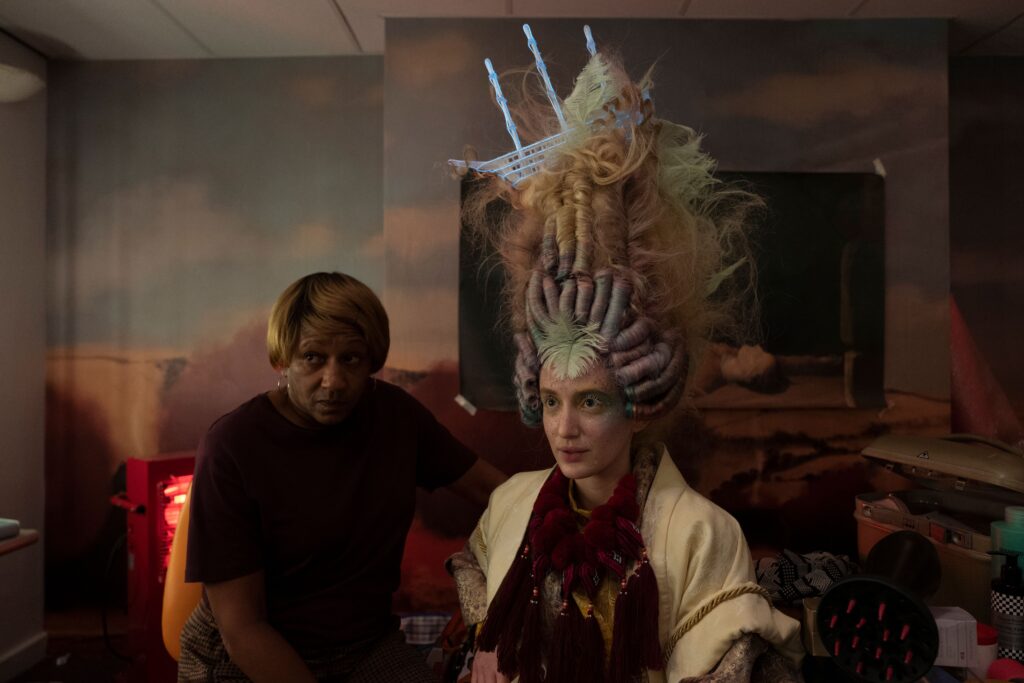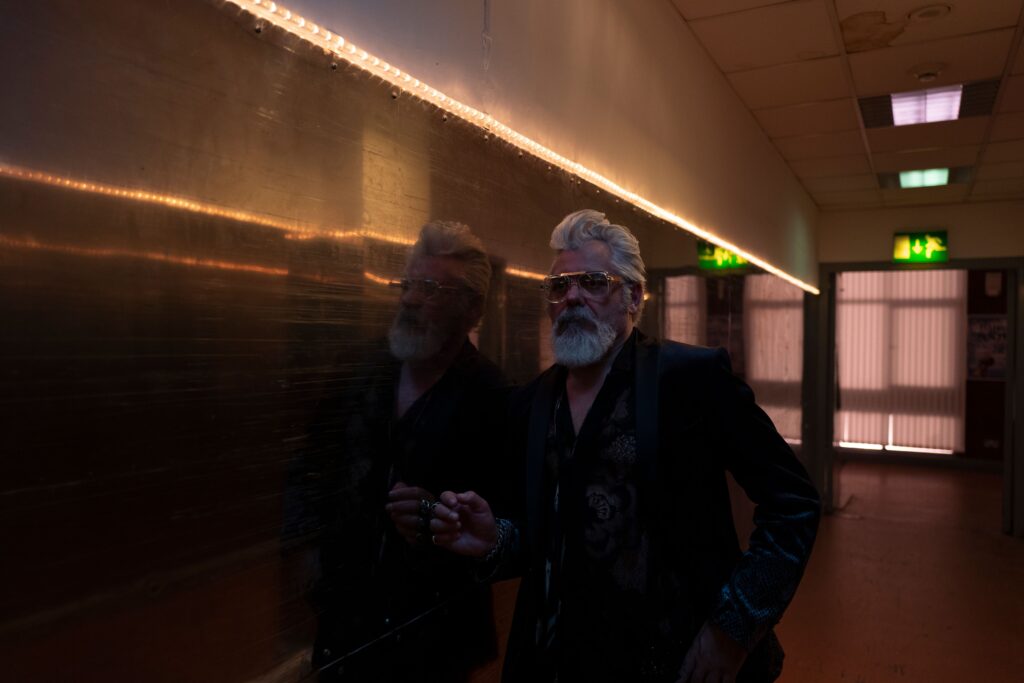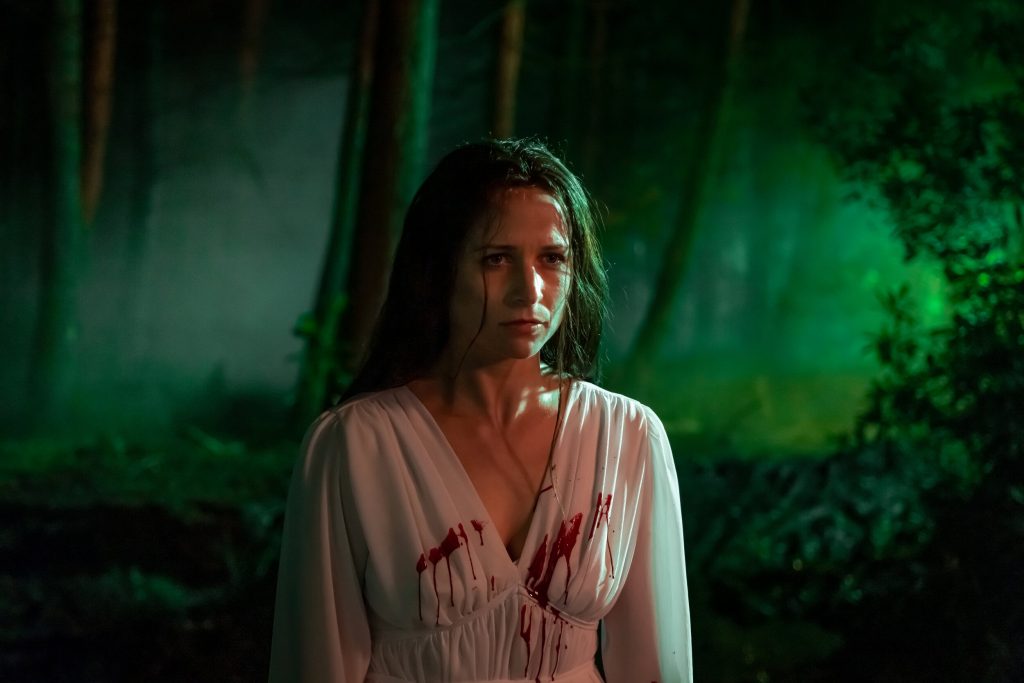October 23, 2023
by Carla Hay

Directed by Thomas Hardiman
Culture Representation: Taking place in an unnamed city in England, the comedy/drama film “Medusa Deluxe” features a racially diverse (white, black, Latin and Asian) cast of characters portraying the working-class and middle-class.
Culture Clash: Hairstylists and their associates, who are preparing for a hairstyling competition, try to solve the mystery of who recently murdered a nearby salon owner.
Culture Audience: “Medusa Deluxe” will appeal primarily to people who are interested in watching offbeat murder mysteries with unusual characters.

“Medusa Deluxe” is an ambitious and interesting but erratic murder mystery happening during a hairstyling contest. This frenetic dramedy would have worked better as a stage play. The characters are memorable though. The best scenes outshine any flaws. “Medusa Deluxe” made the rounds at several film festivals in 2022, including the Locarno Film Festival, where “Medusa Deluxe” had its world premiere. The film is acerbic, often weird, and filmed like it takes place in a neon-lit underground nightclub, where the amateur sleuths are neurotic hairdressers and their associates.
“Medusa Deluxe” is the feature-film debut of writer/director Thomas Hardiman. The movie is definitely not intended to have the same appeal as blockbuster films. It’s the type of quirky independent film where after the first 15 minutes, viewers will either be intrigued enough to want to watch more or will be turned off completely. Some of the characters talk in thick British accents (without English-language subtitles) and use a lot of British slang, so it might be difficult for some viewers to understand certain parts of the movie’s dialogue.
Filmed as if it’s in real time, “Medusa Deluxe” begins in a hair salon, just a few hours before the contest is set to begin. The movie takes place in an unnamed city in England. The people in the salon are abuzz about the death of a rival salon owner named Mosca (played by John Alan Roberts, shown in flashbacks), whose salon is nearby. Mosca had a particularly gruesome murder: He was scalped. No one in the salon seems to know exactly when Mosca was murdered, but they assume (based on what they’ve heard about the condition of his body), the murdered happened in the past 24 hours.
The people in the salon are waiting for investigating police to arrive to interview them. The hairstylist who is the loudest and most volatile in this group is salon worker Cleve (played by Clare Perkins), who is paranoid and superstitious about how this murder will affect her life and her chances in the upcoming contest. Cleve says that her father told her, “Evil will triumph” and “They follow me, dead people.”
Cleve had a tension-filled relationship with Mosca. She tells a story about hitting him over the head once with a shampoo bottle. What Cleve doesn’t say out loud right away but is pretty obvious is that because of her known history of conflicts with Mosca, she might become the prime suspect in his murder. Cleve can’t hide her nervousness about what she will say when the police arrive.
Also in the salon is hairstylist Kendra (played by Harriet Webb), who is another person who doesn’t get along well with Cleve. There’s been some gossip that Kendra and Mosca were conspiring to fix the contest so that Kendra would win. Not surprisingly, Cleve is furious about it. But does that mean Kendra killed Mosca to keep him quiet?
Another hair stylist is Divine (played by Kayla Meikle), who spreads gossip and misinformation, not necessarily to be malicious but because she likes to act as if she knows more than other people do. Three female models who are getting their hair styled for the contest are Timba (played by Anita-Joy Uwajeh), Angie (played by Lilit Lesser) and Etsy (played by Debris Stevenson), whose personalities aren’t as forceful as the hairstylists. Timba is the one who found Mosca’s body. Etsy starts to become suspicious of Kendra.
Some other characters might or might not be persons of interest in this murder. Mosca’s live-in boyfriend Angel (played by Luke Pasqualino), a very flamboyant Colombian immigrant, shows up and makes it known to everyone how much he is grieving. Mosca and Angel have an infant son named Pablo, whom Angel carries around with him, because apparently Angel couldn’t find a babysitter.
It turns out that Mosca was having a secret affair with a man named Rene (played by Darrell D’Silva), the director of a regional hairstyling competition who bankrolled Mosca’s salon. And that revelation adds more potential suspects to the list. Could Rene or Angel be the murderer? There’s also a socially awkward security guard named Gac (played by Heider Ali), who lurks about and seems to want to become friends with Rene.
“Medusa Deluxe” is often a cacophony of arguments, suspicions and resentments that erupt between this group of people. Although they want to know who killed Mosca, the hairstyling contest isn’t far from their minds. No one wants to drop out of the contest because of the murder.
Some of the fun in watching “Medusa Deluxe” is seeing the wild hairstyles that are being created for the contest. The styling of the hair is treated like avant-garde works of art, with wiring and extra materials infused in the hair to achieve the illusion that the hair is some type of art sculpture. (“The bigger, the better” is apparently one of the standards.)
The acting performances in “Medusa Deluxe” are adequate, with the exception of Pasqualino, whose over-the-top mugging for the camera looks amateurish and quickly gets annoying in how it becomes a shallow stereotype of gay men. However, “Medusa Deluxe” is unusual enough to hold the interest of people who don’t mind watching a bunch of unconventional people trying to solve a mystery while under the pressure of being in an upcoming contest that can affect their careers. The answer to the mystery isn’t too surprising, but there are a few clever surprises along the way.
A24 released “Medusa Deluxe” in select U.S. cinemas, digital and VOD on August 11, 2023.


